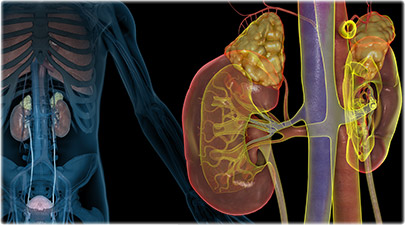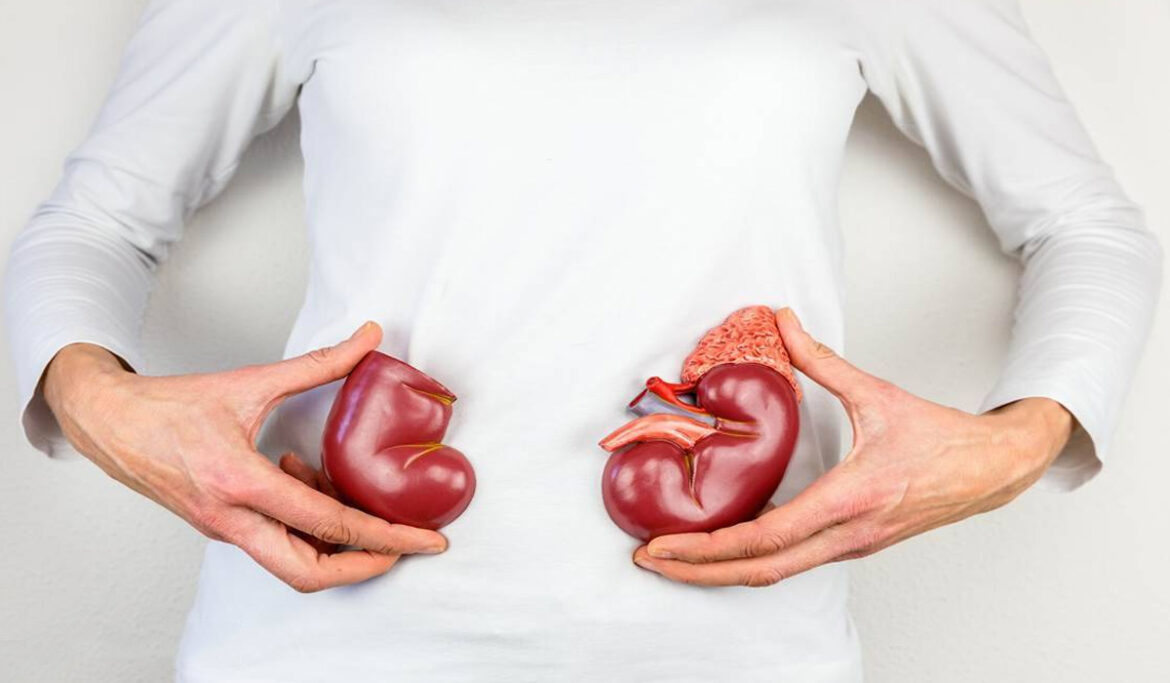What does a kidney do?
The basic job of a kidney is to filter wastes and extra water out of your blood to make urine. These trash collector organs filter about 120 to 150 quarts (30 gallons) of blood and sift out one to two quarts of extra water and waste products. It also keeps your levels of salt and potassium in check. It helps control your blood pressure and make red blood cells.

Each your kidney measures about the size of?
Every human body has two kidneys shaped like beans, and each is about the size of your fist. These organs are located at the bottom of the rib cage on either side of your spine.
About how much blood do your kidneys filter every day?
Every day your kidneys filters about 150-200 quarts (32 gallons) of blood and passes out one to two quarts of extra water and waste products. Every minute, more than 1 quart (about 1 liter) of blood passes through the kidneys. About a quarter of our blood is in our kidneys at any one time, and the kidneys cleanse all of the blood in the body about every 50 minutes.
Can you live with one kidney?
Most people who are born without a kidney or have only one working kidney lead normal, healthy lives. A person may have had one kidney removed during an operation in order to treat an injury or a disease like cancer. A person may have donated one kidney to a person who needed a kidney transplant. Thousands of people donate kidneys each year and stay healthy afterward. In fact, it’s the most common organ donated in the world. If one kidney is missing, damaged, or removed, your other one can grow larger to become nearly the size of two kidneys. That helps it do the job of both.
Kidney stones are usually the size of a tennis ball
Kidney stones form when there’s too much of a certain substance (like calcium) in your urine. They can stay in your kidney or travel down the urinary tract, where you’d pee it out. Kidney stones are different shapes and sizes. As painful as they can be to pass, the stones can be as tiny as a grain of sand or as big as a pearl or rarely a golf ball. You may be more likely to get a kidney stone if other people in your family have had them.
Which of these is the common cause of kidney disease?
The most common causes of chronic kidney disease are Diabetes and High Blood Pressure. High blood sugar levels caused by diabetes damage blood vessels in the kidneys. If the blood sugar level remains high over many years, this damage gradually reduces the function of the kidneys. High Blood Pressure (hypertension). Uncontrolled high blood pressure damages blood vessels, which can lead to damage in the kidneys. And blood pressure often rises with chronic kidney disease, so high blood pressure may further damage kidney function even when another medical condition initially caused the disease.
Which of these could be a sign of something may be wrong with your kidneys?
Kidney problems are generally undetected till it’s in an advanced stage. The most common symptom is a change in the bathroom habits. Having to pee more is the first sign. Sometimes it’s just the opposite. Other symptoms are feeling easily tired, having muscle cramps, lose in your appetite and swollen hands or feet and dry, itchy skin.
What to do you need if your kidneys stop working?
If your kidneys stop working completely for any reason, your body fills up with wastes, fluids, and toxins. You either need to undergo dialysis or kidney transplantation. Dialysis is a treatment that cycles your blood through a special filtering machine to clean wastes and remove extra fluid from your blood. This is the most common type of treatment for kidney failure. A donated kidney may come from an anonymous donor who has recently died or from a living person, usually a relative. The kidney to be transplanted must be a good match for your body for acceptance and proper functioning.
When you are dehydrated, your urine is usually?
Not drinking enough water and other fluids can lead to dehydration. Lack of fluids can damage your kidneys and even cause kidney stones. A common test of dehydration is the color of the urine. If your urine is clear you are well hydrated. If it is dark yellow you are clearly dehydrated.
Which medicines are more likely to hurt your kidneys?
Every drug you put in your body passes through your kidneys as its job is to filter your blood. Certain pain medicines like aspirin, ibuprofen, and naproxen are most likely to your kidneys, especially if you take too much and too often. Drink plenty of water when taking the medicine. Consult a doctor regarding the usage and dosage of such medicines.
Find more details on Kidney Transplant in India at affordable costs.
